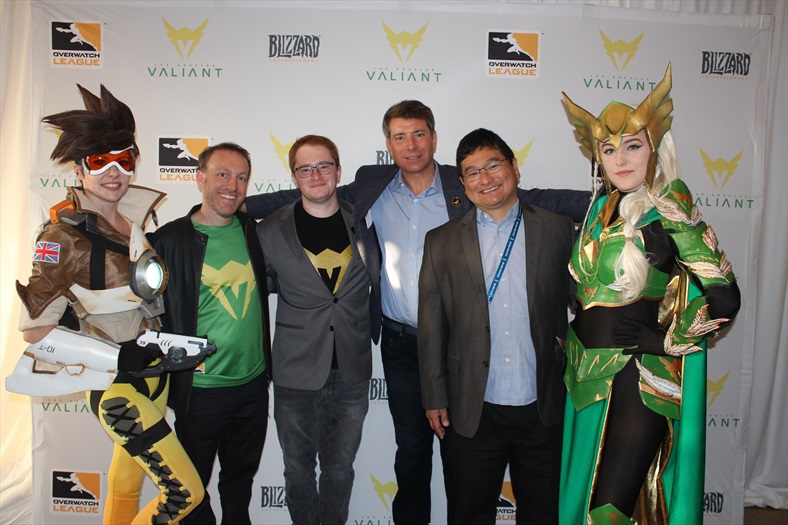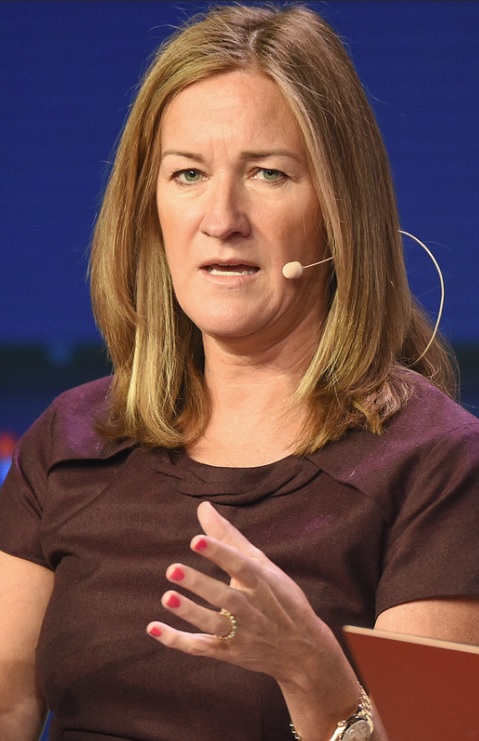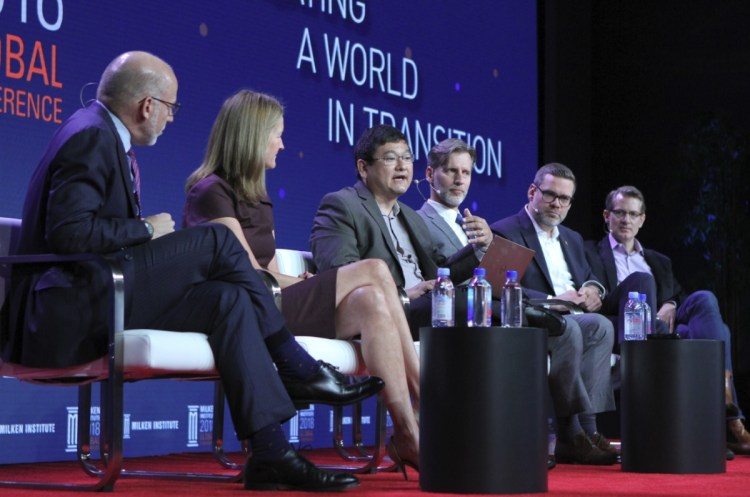Hand: If there’s anything, for any of you new to esports, that we can debunk here today–it’s no different than traditional sports. The difference between what makes a good and a great athlete is all the additional dimensions of commitment, hard work, practice, being coachable, being a good team player. It’s all of those extra layers. The emotional intelligence, the resilience. These things can only happen through the structure of these great professional leagues and all the other resources and support they put around these people to push them to reach their maximum potential.
GamesBeat: Here’s a rapid-fire question for each of you. How do you decide what a great venue is going to be? How do you build local affinity for esports? How is mobile esports going to take off? How do you spin up a league where you do have local affinities going on? And how do you spin up a team?
Cohen: The optimal venue is a multi-variable equation. It’s going to depend on the type of game, the expectation of how large the crowd is going to be, where you are geographically – what plays well in Berlin is different than what plays well in Stockholm is different than what plays well in Los Angeles. Start with that, with an understanding of what you’re presenting to the world and what the fanbase is and how many people you expect to be there.
Then you get into the logistics and the technology of how you deliver it in a way that’s immersive. That’s incredibly important for us, because the experience is intensely enhanced if people feel that they’re truly in the game. If it’s just going to be one-dimensional, just looking forward, there isn’t sound, there isn’t a touch and feel that makes you feel like you’re part of everything, that’s going to backfire on you. You’re not going to get these same people to talk to their friends and come back themselves again.
June 5th: The AI Audit in NYC
Join us next week in NYC to engage with top executive leaders, delving into strategies for auditing AI models to ensure fairness, optimal performance, and ethical compliance across diverse organizations. Secure your attendance for this exclusive invite-only event.
By way of example, for Immortals, and particularly for the L.A. Valiant, it’s not that the Microsoft Theater is their home venue. The entirety of L.A. Live is their home venue. We’ll do things in 200-seaters, in 500-seaters, in 1,000-seaters, in 4,000-seaters, and 18,000-seaters. It’ll all depend on what we’re doing and who’s there. Is it a practice session, where we have some of the Lakers or the Kings involved? Or is it a grand finale where we’re competing against one of the best teams in the world?
Hand: How do you build local affinity? We spotted an insight a few years ago, very similar to the guys at Activision Blizzard with the Overwatch League, which was that there was a lack of locality to gaming. It was hyper-fragmented. Gamers had a desire to self-identify. So we introduced, for our amateur league system, city-based teams and clubs.
For us, what’s unique about that is this is the unifying umbrella for all of our game titles. Whether it’s 6-to-14-year-olds playing in our youth league around Minecraft, or 16-30-year-olds playing around League of Legends and other titles we’re introducing soon, everyone who plays in L.A. is a member of the L.A. Shockwaves. We have a member of the Shockwaves right there, because I see Monkeyman in the front row.
It’s important, in a way — again, I feel like this was a bit of a moment that was a breakthrough for us. In the early days, we thought we couldn’t possibly have a 30-year-old identifying to a brand called the Shockwaves, and having a cute little fresh-faced 10-year-old with their parents identifying to that same brand. There’s this edginess to some of the older game titles that you can’t mix with the apple pie of Minecraft. But what we realized through the city clubs was that actually, that’s the beautiful, positive, unifying umbrella.
I always overuse the analogy, but now, when I have one of my hardcore League of Legends players walking down the street — he’s 28. He’s wearing his Shockwaves jersey. He passes Monkeyman there. He just thinks he’s Kobe Bryant and you’re a Lakers fan. It works. But in a really neat way, I think it flips the problem on its head. It allows two very different demographics to identify with each other, to spot the one thing they have in common, which is a love of gaming. And in a strange way, it turns it into a bit of a mentor-mentee relationship.
The younger Overwatch players probably played Minecraft as well. It’s a very natural way to start to identify and show the path and progression that people make from the earliest games, which get them positively engaged in gaming, through to games that we can start to create new features for.

Above: Lionsgate’s esports reception.
Hermann: On mobile esports, I strongly believe that mobile is the new frontier for esports. PC and console aren’t going away any time soon. They’re seeing steady growth. But if you look at the numbers, mobile is outpacing that growth.
If you look at the younger generation, a lot of kids growing up today may not even have a PC anymore. They may not invest in a console. Technology has come such a long way that the kind of games you can play on mobile today are starting to compete with what’s happening on more traditional platforms.
If you look at countries that don’t have a strong history of PC or console gaming, especially in Asia — China is huge when it comes to mobile. Tencent’s most successful game in China, Honor of Kings, has about 200 million active monthly players. The numbers are enormous. Tencent has just started to set up a league along a very similar structure to Overwatch that’s franchised in China. It’s just a matter of time until we hit that critical mass in the west.
I don’t know how long it’s going to take. We’re just trying to explore how it’s going to work here. It might be a bit slower than what we’ve seen in Asia, but I’m convinced that it’s going to happen.
GamesBeat: A lesser-known fact is that mobile gaming is now half of all gaming revenue, $70 billion out of $138.
Nanzer: How do you start a league? It’s super easy. [laughs] I get to do panels and talks like this all the time, and I get way too much credit for launching the league. Overwatch League is countless hours of work from a huge team across the entire organization.
One of the most important pieces of the puzzle was getting great team owners. Franchising the Overwatch League, we wanted to make sure first and foremost that we had great operators. Running an esports team is not an investment. It’s not a thing you’re going to put money in and get money out. It’s like a sports team. You need to operate it.
We wanted to make sure had world-class operators to help us launch the league and do that together. We’re not going to be able to build fandom in New York and Boston and Seoul and Shanghai unless we have great team owners that are going to be investing and growing in those markets. What it really took to launch the Overwatch League was getting the structure right, making sure we had a structure that was attractive to outside investment, a structure that was going to really be one that’s oriented around value creation for all the stakeholders involved.
From an operations perspective, we built a team around the Overwatch League that’s able to learn from Blizzard’s 20-year history in esports. The original StarCraft, to a lot of people, is the first esport, a game that came out in 1998. We have two decades of learning about how to operate esports event from a very tactical standpoint. But we’ve also build a team around the Overwatch League with a lot of folks from traditional sports and media. We have folks on our team from the NBA, from Fox Sports, places like that. The combination of everything we know about gaming and esports and esports communities with best-in-class operators at the team level, from traditional sports and media and within our team, that part of our special sauce around the Overwatch League.
GamesBeat: There’s a tougher question for you, which is, what happens when the Fortnite league comes along and steals part of your audience?
Nanzer: First part of your question, what happens when the Fortnite league comes along? That’s cool. I like Fortnite. Second part of your question I disagree with. I don’t think esports is a zero-sum game. There’s a tremendous amount of audience out there. You see this play out now. Go to Twitch on Saturday and you have 150,000 to 200,000 people watching Overwatch and League of Legends and Ninja playing Fortnite. Over the next few years we’ll end up with the tier one esports — the NBA, NFL, MLB, and NHL — but there’s also going to be a tranche below that with dozens of games that all have hardcore dedicated audiences, even if they’re maybe not on the same scale. They’ll still have thriving esports scenes.
We’re still at the phase in esports development where a rising tide lifts all boats. There’s still a lot of work to do as an industry, but overall we’re in a good spot. The work that folks like Anne are doing at Super League Gaming—the thing that’s exciting to me, I have a son who’s about to turn eight. He plays Roblox now. But him and all of his friends — I look at the Blizzard Arena every Friday and Saturday, where we have tons of 12- and 13- and 14-year-olds there — these kids are not going to magically start watching football when they turn 25. They’re not going to turn 30 and say, “Well, now I’m gonna watch TV.”
These kids are growing up watching Overwatch, League of Legends, and Vainglory. They’ll be fans for life, in the same way that I, for some reason, am still a San Diego Padres fan. My dad made me watch the Padres. That’s stuck with me my whole life. That’s the big shift that’s happening right now. Through Twitch and YouTube and everything in China and all these different platforms, this is what kids watch today.
It’s premium content. That’s the thing people miss. They think, “Oh, it’s that Ninja thing,” a guy in his house playing video games. No. It’s premium content. I promise you that the guy in the front row there thinks this is significantly more premium than anything on ABC, CBS, or NBC. That’s not going to change.
GamesBeat: The traditional entertainment leaders were on stage yesterday. I think the thing that scares them is that millennials are not watching TV, right? Where are they going? Where are they watching things? It’s online and it’s esports. The fact that the traditional sports owners are coming in, in some ways they’re reading the writing on the wall. They may be facing a declining future.
Cohen: One quick element of what I also think has been part of the true success of the Overwatch League. We’re in a number of traditional sports leagues — NBA, NHL — and we were there at the beginning of MLS. We’ve ridden that to where it is today. The big differentiator in one respect between legacy sports and things like esports, you now have, in the hands of the publishers — they quite literally own the sport.
To successfully build a league, the most critical thing is to create an alignment of incentives with those people that are coming in to invest in teams. If the feeling is that someone can steal the rug out from under you and say, “It’s my ball. I’m going home,” we’re not going to extend ourselves to build it out. That’s been a terrific job that Activision Blizzard has done in the regard for folks like us who’ve come into the game.

Above: Ann Hand, CEO of Super League Gaming.
Wakeford: So, building teams. It’s a commitment. It’s a commitment of capital, of resources, and of time. If you think about building teams, if you want to have a framework by which you can look at it and think about it, when am I going to invest? Where am I going to put my capital and my resources?
We have a relatively simple framework we use, a kind of three-pronged framework. First, we look at the game. Is the game conducive to an esport? Is it conducive to aggregating a large audience? Is it conducive to longevity, so you can play for a long time? These are all questions that investors often ask.
You’re seeing popularity around games. We mentioned a game called Fortnite, which is shooting through the roof. It’s relatively new, but it’s seeing rocketship growth and a lot of excitement behind it. Obviously esports owners are looking at it. But the other thing is longevity. This a question I hear all the time. Why are you investing in esports? It’s not like the NBA that’s been around for a long time. If the game goes away next year, do you just start another team? How does that work? You have to look at the core esports games that are out there. DOTA. Counter-Strike. League of Legends. These games have been in the market for more than 10 years and they’re still growing. You want to look at those hallmarks.
The next element is the league structure, the operations, and the tournament infrastructure. If I do have a team, where are they going to play? Are they playing in tournaments, in individual games? You want to see if there’s the potential for healthy league infrastructure. And then I would say what’s most important for us as a team ownership group, and I’ve heard this echoed many times, is franchises.
The ability to go in and, even if it’s a much higher capital expenditure — what we’ve done with the Overwatch League or with others is we’re writing a very big check, but we’re securing rights for something in perpetuity. With the Overwatch League we own Seoul for our team. With others you have an exclusive franchise or number of franchises.
That allows you, as a team owner, to make long-term investments. Invest in the teams, the coaches. You can also bring on partners. Obviously this is driven by sponsors and by streaming rights and other things, similar to what you see in traditional sports leagues. We need to be able to make long-term commitments so we can create long-term revenue streams. Also, on the fan side, we can build long-term relationships with fans.
If there’s a game that has all the hallmarks of being a great esports, and there’s a franchise opportunity for us, we’re definitely look at it. Those are the first two prongs. The third is, can we build a competitive team? Can we build a championship team that goes out there and can play? In our business we focus on Asia, bringing Asian esports players to a global stage. We have the advantage of some games to bring champion players west. But that’s not true for all games. PC adoption far outpaced console adoption in parts of Asia. When you get to console-based games, we don’t have as healthy a pool of players to draw from.
For us, it’s the game, the franchise opportunity, and then if we can pull together a great team that competes at the highest echelon. That’s how we think about team-building.

